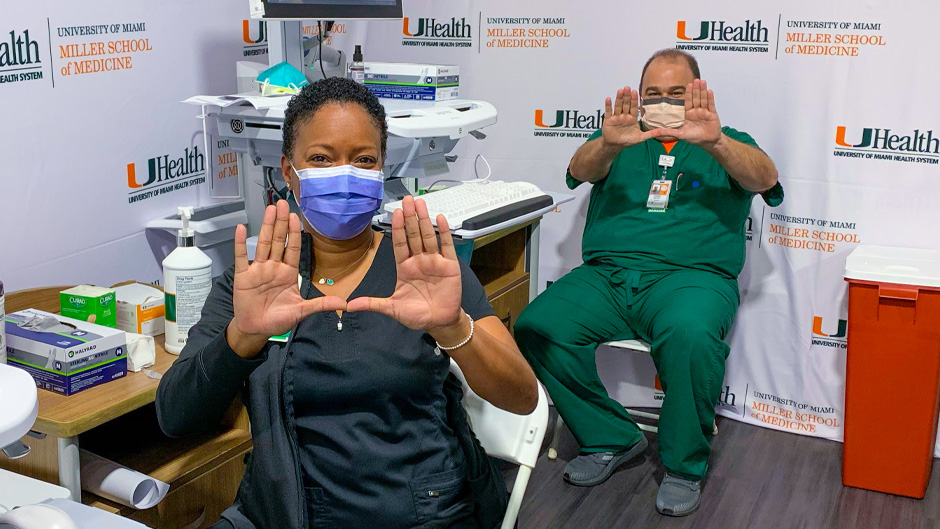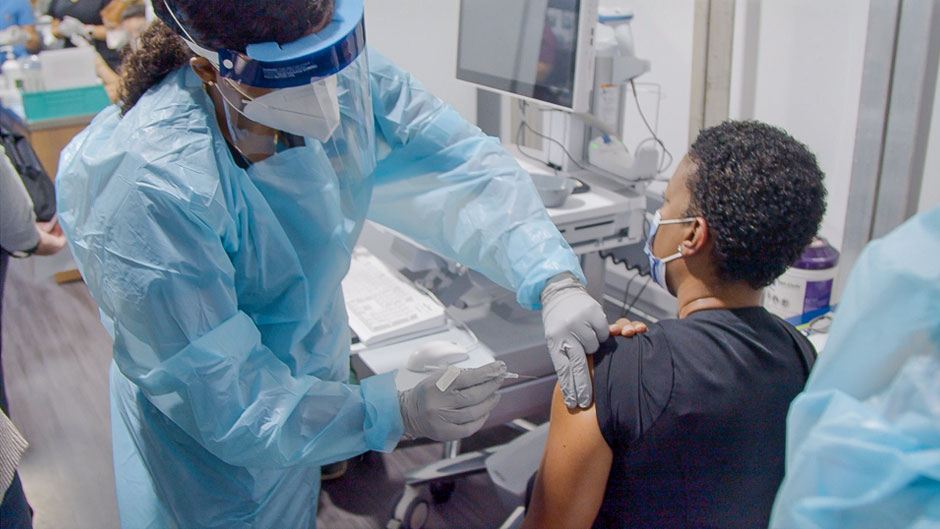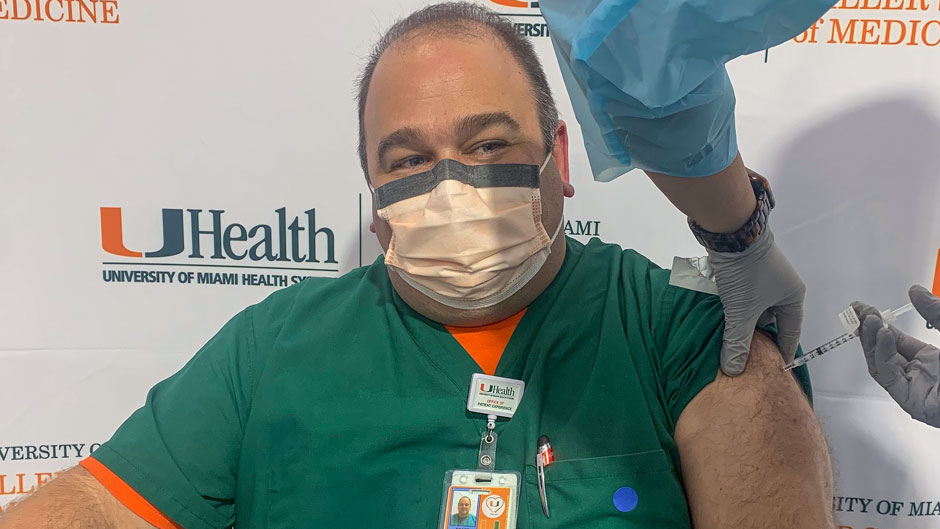As masked friends and colleagues clapped and snapped photos from six feet away, Joe Falise and Kimar Estes, both nursing leaders at UHealth, the University of Miami’s health system, rolled up their sleeves Tuesday afternoon to receive the first COVID-19 vaccines administered on the University’s Medical Campus. Both said the experience was pretty painless, and now they are hoping their staff will follow suit.
“I consider it a privilege,” said Falise, nurse manager for the intensive care units and the COVID-19 unit, who has been working at UHealth for 12 years. “And now, everyone should do this. We need to do our part in order to get rid of this pandemic. We know it’s not going to go away on its own. We know that social distancing, mask wearing, and washing our hands works, but having a vaccine will clearly be the answer.”

Next came Ossie Alfonzo, director of environmental services, and Veronica Valdes, an environmental services technician. Alfonzo oversees the cleanliness of the UHealth Tower’s 560 patient rooms, including the COVID-19 unit, which requires cleaning three to four times per day. Both worry about passing the virus to their families when they return home each night, and they felt relieved to get the vaccine.
Anthony Addonisio also lined up to get the vaccine. As director of food services at UHealth, which is contracted through Compass One, his employees deliver 7,500 meals to patients and employees each day. And he often visits the COVID-19 unit with dieticians, nutritionists, and patient advocates.
“I think we’re always afraid of the unknown, but at the end of the day it comes down to what’s right. And if this helps save people’s lives, then I think we all need to do it,” he said.

About 90 UHealth employees eagerly waited in line to receive the first COVID-19 vaccine given emergency use authorization by the U.S. Food and Drug Administration last weekend. COVID-19 vaccine operations leader Kathy Stella said she was encouraged by the enthusiasm from UHealth employees, many of whom were asked via email on Sunday if they would get the vaccine. Within 15 minutes, she said, 150 people had scheduled themselves for it. On Wednesday, the team hopes to vaccinate 600 more employees.
“This is a monumental time in history and hopefully it will be the beginning of what will be a turning point for one of the most challenging years around,” Stella, who is also assistant vice president of ambulatory services for UHealth, told employees setting up to register the first vaccine recipients.
Dr. Roy Weiss, the University’s chief medical officer for COVID-19, said he was jubilant that the long-awaited day had finally arrived. It is the culmination of months of planning and preparations from his COVID-19 Taskforce of faculty and staff from UHealth and the Miller School of Medicine.
“For society in general, this is a game changer. This will enable us—several months from now, depending upon the rate at which we vaccinate people—to be able to resume a life similar to what we knew before the pandemic,” he said. “It’s not by coincidence that this is December—a time of miracles, a time of hope, a time when the world really comes together to help everyone else, and I think it’s just so beautiful that this is when we see the realization of this vaccine.”
In the next week, the University hopes to vaccinate about 3,000 employees in the UHealth system. It has started with the employees who directly care for COVID-19 patients, such as doctors, nurses, food delivery workers, respiratory therapists, pharmacists, and custodial workers, Weiss said.
“It’s very important, since we are now amidst a surge of cases, that we are able to maintain our workforce to take care of these patients. So, those are the individuals we want to vaccinate first,” he added.
Dr. Susanne Doblecki-Lewis, clinical director of the infectious disease unit in the Miller School, is also a part of the COVID-19 Taskforce. She is also the University’s site leader for the Moderna vaccine trials, which wrapped up about a month ago and is expected to receive emergency use authorization from the FDA later this week. Doblecki-Lewis, who has treated many patients with COVID-19 and said she often felt powerless against the disease, was joyful and relieved that the first vaccinations are starting.
“It’s very exciting to be at this point where we have the chance to turn the corner and to have some hope toward ending the pandemic,” she said. “Having a vaccine gives us something that we can do proactively to protect ourselves, our families, and the people around us.”
Although the vaccines are voluntary, Doblecki-Lewis said she would be getting hers as soon as possible and hopes others will too.
“To me, preventing a disease is always better than having to treat it, and COVID-19 has always been such an unpredictable disease. It’s acted so differently in different people, and some people you wouldn’t think would have severe symptoms end up having very severe symptoms. So, having the ability to prevent that just really takes so much chance out of the equation,” she said.
The rapid eight-month timeline of the vaccine’s development is causing some to hesitate about getting it. Doblecki-Lewis said that she is comforted by the fact that even in an emergency use situation, the FDA requires results from large clinical trials prior to authorization. And although other vaccines have taken years to create, it’s because of the sheer breadth of the COVID-19 pandemic that things happened so quickly. Instead of skipping steps in the development process, government resources were simply allocated better and faster, she said.
Once it was clear UHealth would be receiving vaccines, a tent was erected on the Medical Campus to be the staging ground for administering the doses. As more vaccine shipments arrive, Weiss said, they plan to open other locations on the Medical Campus, at some satellite UHealth locations, and at the University’s two other campuses.
For the past 10 days, crews from UHealth’s department of emergency management, facilities, safety and compliance, pharmacology, nursing, and information technology worked in concert with construction crews to prepare the tent and to ensure that the entire vaccination process was safe and efficient. Vincent Torres, emergency management director for UHealth and the Miller School, said that planning for the vaccination rollout has been a challenge like no other.
“This has been like nothing anybody has ever experienced in disaster management in health care,” Torres said. “Generally, when you have a disaster, you go help and come home, and eventually everything is fixed. With this, it’s nonstop; it affects you personally. And it is extremely complicated.”

